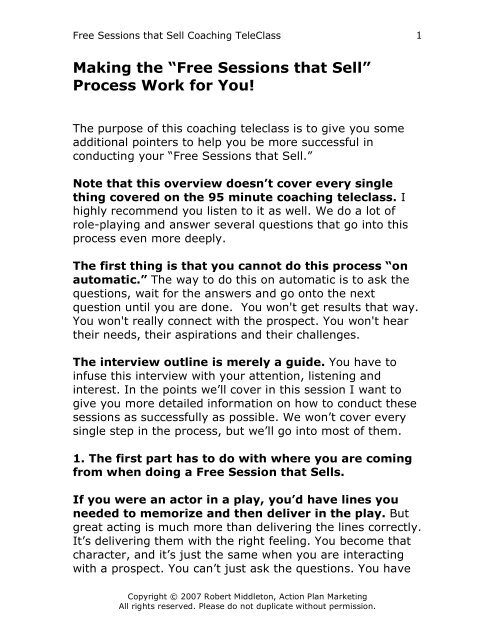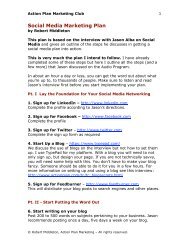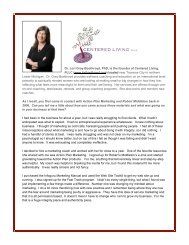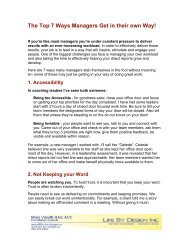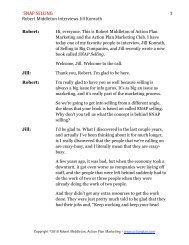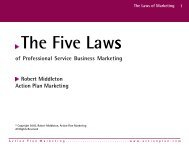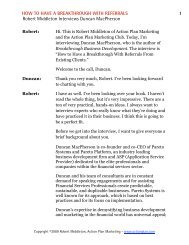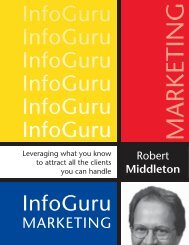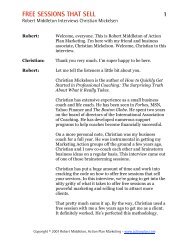Free Sessions that Sell - Action Plan Marketing
Free Sessions that Sell - Action Plan Marketing
Free Sessions that Sell - Action Plan Marketing
You also want an ePaper? Increase the reach of your titles
YUMPU automatically turns print PDFs into web optimized ePapers that Google loves.
<strong>Free</strong> <strong>Sessions</strong> <strong>that</strong> <strong>Sell</strong> Coaching TeleClass<br />
1<br />
Making the “<strong>Free</strong> <strong>Sessions</strong> <strong>that</strong> <strong>Sell</strong>”<br />
Process Work for You!<br />
The purpose of this coaching teleclass is to give you some<br />
additional pointers to help you be more successful in<br />
conducting your “<strong>Free</strong> <strong>Sessions</strong> <strong>that</strong> <strong>Sell</strong>.”<br />
Note <strong>that</strong> this overview doesn’t cover every single<br />
thing covered on the 95 minute coaching teleclass. I<br />
highly recommend you listen to it as well. We do a lot of<br />
role-playing and answer several questions <strong>that</strong> go into this<br />
process even more deeply.<br />
The first thing is <strong>that</strong> you cannot do this process “on<br />
automatic.” The way to do this on automatic is to ask the<br />
questions, wait for the answers and go onto the next<br />
question until you are done. You won't get results <strong>that</strong> way.<br />
You won't really connect with the prospect. You won't hear<br />
their needs, their aspirations and their challenges.<br />
The interview outline is merely a guide. You have to<br />
infuse this interview with your attention, listening and<br />
interest. In the points we’ll cover in this session I want to<br />
give you more detailed information on how to conduct these<br />
sessions as successfully as possible. We won’t cover every<br />
single step in the process, but we’ll go into most of them.<br />
1. The first part has to do with where you are coming<br />
from when doing a <strong>Free</strong> Session <strong>that</strong> <strong>Sell</strong>s.<br />
If you were an actor in a play, you’d have lines you<br />
needed to memorize and then deliver in the play. But<br />
great acting is much more than delivering the lines correctly.<br />
It’s delivering them with the right feeling. You become <strong>that</strong><br />
character, and it’s just the same when you are interacting<br />
with a prospect. You can’t just ask the questions. You have<br />
Copyright © 2007 Robert Middleton, <strong>Action</strong> <strong>Plan</strong> <strong>Marketing</strong><br />
All rights reserved. Please do not duplicate without permission.
<strong>Free</strong> <strong>Sessions</strong> <strong>that</strong> <strong>Sell</strong> Coaching TeleClass<br />
2<br />
to put your full self into them.<br />
Put your attention and focus on helping the prospect,<br />
not trying to “sell” them. You are asking the questions<br />
about their goals and their challenges to see if what you<br />
have can honestly assist them. You're not trying to “get<br />
through these questions” so <strong>that</strong> you can close. You are<br />
digging deeply into the psyche of your prospects with these<br />
questions to discover the possibilities of working together to<br />
make a difference.<br />
Treat your prospects with empathy, respect and<br />
caring. You might be able to fake this, but ultimately if you<br />
don't make this kind of connection with a prospect, they'll<br />
see right through you. They will feel you are using a<br />
technique on them instead of working with them from a<br />
place of integrity. Feel where your prospects are coming<br />
from. Be concerned and interested in their goals and<br />
dreams. Be someone it is a privilege to have a conversation<br />
with.<br />
You’ll get better at this the more <strong>Free</strong> Session you do.<br />
And every time you do a session, it should be like the very<br />
first time. You want to be totally present with the prospect.<br />
The first two part of the process are getting into rapport and<br />
then learning about the goals the prospect wants to achieve.<br />
But the next part, part three, really gets into what’s behind<br />
those goals.<br />
2. Part three of the <strong>Free</strong> <strong>Sessions</strong> Process is learning<br />
what the impact would be of achieving their goals. Go<br />
into this as deeply as possible. It's one thing to have a goal<br />
or a dream and quite another thing to explain what <strong>that</strong><br />
really means. You do this by asking questions such as “What<br />
would be the best part of achieving <strong>that</strong> goal?” and “What<br />
would <strong>that</strong> really mean to you?” and “If you achieved <strong>that</strong><br />
goal what would you do next?”<br />
Copyright © 2007 Robert Middleton, <strong>Action</strong> <strong>Plan</strong> <strong>Marketing</strong><br />
All rights reserved. Please do not duplicate without permission.
<strong>Free</strong> <strong>Sessions</strong> <strong>that</strong> <strong>Sell</strong> Coaching TeleClass<br />
3<br />
For instance, if a prospect said: “I'd like to make<br />
$500,000 per year.” I'd ask questions like, “What would you<br />
buy with <strong>that</strong> $500,000?” And if they said, <strong>that</strong> they'd put it<br />
away for a secure retirement, I'd ask “Why is a secure<br />
retirement so important to you?”<br />
Whatever they said they really wanted, I'd try to get to<br />
the bottom of it. Why does <strong>that</strong> goal excite them? What's<br />
the best part of it? How long have they had <strong>that</strong> goal? What<br />
would <strong>that</strong> goal ultimately help them achieve?<br />
If you don't get to the heart of the goal, you don't get<br />
to the heart of the motivation to work with you. And if<br />
you don't get to the heart of the motivation, why should<br />
they work with you?<br />
3. Part four of the <strong>Free</strong> <strong>Sessions</strong> Process is uncovering<br />
the challenges to achieving their goals. Ask them, “Now<br />
<strong>that</strong> you’ve told me what you want to achieve, let’s talk<br />
about what’s in the way of achieving those goals. What<br />
challenges do you typically face when attempting to achieve<br />
a big goal like <strong>that</strong>?<br />
First listen to the challenges as they tell them to you.<br />
Make sure you hear them and feed them back to the<br />
prospect: “My biggest challenge is just getting started. This<br />
is a real goal for me but I get stuck in the beginning stages.”<br />
And you respond, “OK, just getting started is one of your<br />
biggest challenges.” And then you might ask a question for<br />
clarity, “Do you tend to take some steps and get bogged<br />
down or do you never get past just thinking about the goal?”<br />
And they might say, “Well I think about it and I might do<br />
some things. But I plan a lot in my head and <strong>that</strong> planning<br />
rarely turns into action.” And then you could say. “Can you<br />
give me an example?”<br />
The more you understand what stops them the better. And<br />
Copyright © 2007 Robert Middleton, <strong>Action</strong> <strong>Plan</strong> <strong>Marketing</strong><br />
All rights reserved. Please do not duplicate without permission.
<strong>Free</strong> <strong>Sessions</strong> <strong>that</strong> <strong>Sell</strong> Coaching TeleClass<br />
4<br />
once they've told you their challenges and you've clarified<br />
them, you can also prompt them with Christian's five basic<br />
challenges:<br />
a) Lack of clarity<br />
b) No strategy or plan<br />
c) Lack of sufficient skills<br />
d) Non-supportive environment<br />
e) Psychological barriers<br />
You might say something like, “It sounds like one of your<br />
challenges is just getting clear about the goal itself. Is <strong>that</strong><br />
true?” Or, “It seems you are pretty clear about the goal but<br />
don't really have a plan to accomplish it.”<br />
Use these five basic challenges and learn how true they<br />
are for your prospect. Some of them may be true. All of<br />
them may be true. And the more aware the prospect is<br />
about these challenges, the more they realize they need<br />
some assistance.<br />
4. Part five of Process is now learning how these<br />
challenges are impacting them. It's one thing to have<br />
challenges, it's quite another thing to see how these<br />
challenges are stopping them from achieving their goals. So<br />
help them connect the dots by digging more deeply into this.<br />
Just go through the challenges they've articulated one<br />
at a time. “OK, now <strong>that</strong> you've told me the challenges in<br />
reaching your goals, let's look at the impact these<br />
challenges are having on your business (or relationships or<br />
life, etc.)”<br />
And then, you’d continue: “You said <strong>that</strong> you’ve had<br />
trouble getting projects started and on track and <strong>that</strong> it's not<br />
unusual <strong>that</strong> most of these projects never get completed.<br />
How is <strong>that</strong> impacting your business?”<br />
Copyright © 2007 Robert Middleton, <strong>Action</strong> <strong>Plan</strong> <strong>Marketing</strong><br />
All rights reserved. Please do not duplicate without permission.
<strong>Free</strong> <strong>Sessions</strong> <strong>that</strong> <strong>Sell</strong> Coaching TeleClass<br />
5<br />
And then ask other questions to go even deeper, such<br />
as: “What do you think it's costing you in your business not<br />
to complete these projects?” (Actually try to come up with a<br />
dollar amount.) And, “How does it feel to you <strong>that</strong> a large<br />
percent of these projects are not completed?”<br />
And then go on to the next challenge. During this part of<br />
the session, you need to be very straightforward, very<br />
matter of fact. You are not telling them what the challenges<br />
are costing them. They are. They are outlining exactly what<br />
it means to them to be stopping in achieving their goals.<br />
5. Part six is where you turn things around. This is<br />
where you ask, “If you could wave a realistic magic wand,<br />
what would it be like for you to overcome these challenges<br />
to achieving your goals?” And, again, you don't want<br />
superficial answers; you really want them to paint a picture<br />
for you.<br />
They might say something like, “It would be great! I'd<br />
achieve all my goals.” But you want them to be more<br />
specific. “Tell me exactly what it would look like. What would<br />
happen? What would you do differently, <strong>that</strong> you're not<br />
doing now?”<br />
Get them to talk about the goals they would achieve and<br />
what <strong>that</strong> would mean to them. Prompt them if you have to.<br />
“You said you wanted to make $500,000 this year but <strong>that</strong><br />
it's unlikely given <strong>that</strong> you keep getting stalled on projects.<br />
What would you start to do to move towards <strong>that</strong> goal if<br />
those challenges were no longer stopping you? How much<br />
more money would you make this year compared to what<br />
you made last year? And what would <strong>that</strong> mean to you?”<br />
6. In part eight of the process you give a precise<br />
overview of what your service consists of and how it<br />
helps them overcome the challenges to achieving their<br />
goals. I highly recommend <strong>that</strong> you have this part written<br />
Copyright © 2007 Robert Middleton, <strong>Action</strong> <strong>Plan</strong> <strong>Marketing</strong><br />
All rights reserved. Please do not duplicate without permission.
<strong>Free</strong> <strong>Sessions</strong> <strong>that</strong> <strong>Sell</strong> Coaching TeleClass<br />
6<br />
out. If not, you'll tend to ramble. You want to say something<br />
like the following.<br />
“Our program (or service) is designed to assist you in<br />
achieving your (marketing, business, relationship, life, etc.)<br />
goals and overcoming your challenges to making them<br />
happen. The program consists of these “X number” of parts<br />
(and then outline the parts). You need to customize this for<br />
your business. They may include Christian’s five parts:<br />
a) Increase your clarity, focus and direction<br />
b) Help you create a specific strategy and plan to…<br />
c) Train you in building the needed skills, such as…<br />
d) Work on creating a supportive environment<br />
e) Deal with the psychological barriers <strong>that</strong> stop you<br />
In the course of discussing the things <strong>that</strong> are covered in<br />
your services you might also insert brief stories or case<br />
studies. Demonstrate <strong>that</strong> you have actually produced<br />
results with actual clients.<br />
Remember, these are generic; you need to fit them into<br />
your specific program or service. Then explain the basic<br />
structure in which these services are delivered. “Typically I<br />
meet with clients once a week for a 90 minute session. In<br />
these sessions we'll develop strategies and plans and you'll<br />
receive assignments to do between sessions. You'll send me<br />
those assignments before the next sessions, etc.” Again, this<br />
has to be customized to how you structure your work with<br />
clients.<br />
This next part was not part of the original process, but it is<br />
very useful to help the prospect make a commitment.<br />
7. Finally, before you talk about your guarantee and<br />
your price I'd want to confirm <strong>that</strong> the prospect is on<br />
board and will do their part to make this work together<br />
successful. You might say something like this:<br />
Copyright © 2007 Robert Middleton, <strong>Action</strong> <strong>Plan</strong> <strong>Marketing</strong><br />
All rights reserved. Please do not duplicate without permission.
<strong>Free</strong> <strong>Sessions</strong> <strong>that</strong> <strong>Sell</strong> Coaching TeleClass<br />
7<br />
“Prospect, this program is proven to help you achieve your<br />
goals and to overcome the challenges to achieving them. It's<br />
worked for many, many people. But ultimately the success<br />
of the program will depend on your commitment to follow<br />
through. If you don't follow through it will be a waste of your<br />
time and my time. So my questions is, given <strong>that</strong> this is<br />
going to take some work on your part and an investment of<br />
time, energy and money, why would you want to do this<br />
now?”<br />
The purpose for a question like this is to gauge their<br />
commitment and to have them sell you on doing it.<br />
Ultimately, if they don't sell themselves, they won't do it or<br />
they'll do it without a real commitment.<br />
If they answer with, ”Well, what I've really been looking for<br />
is the support and some help with the skills <strong>that</strong> would help<br />
me accomplish my goals. So, yes, this is something I will<br />
really commit to do,” then you have someone who has sold<br />
themselves on getting some assistance.<br />
At this point they may ask some questions about the<br />
program. Answer them very matter-of-factly, always<br />
pointing to the results. For instance: ”You say you'll support<br />
me in getting my book written in six months or less. Is <strong>that</strong><br />
realistic?” And you answer, “This happens for about 80% of<br />
my clients. The other 20% typically take a few months<br />
more. I'll be giving you very specific step-by-step<br />
assignments. If you do <strong>that</strong>, the book will be ready in six<br />
months. Can I count on your to complete all the<br />
assignments on time?”<br />
8. Finally you want to talk about the guarantee and the<br />
price and payment. One of the big keys to closing the deal<br />
is to get the payment now, not later. Once they say, yes,<br />
they want to move forward, don't slow things down. Only<br />
large companies need proposals. And if you're working with<br />
Copyright © 2007 Robert Middleton, <strong>Action</strong> <strong>Plan</strong> <strong>Marketing</strong><br />
All rights reserved. Please do not duplicate without permission.
<strong>Free</strong> <strong>Sessions</strong> <strong>that</strong> <strong>Sell</strong> Coaching TeleClass<br />
8<br />
a large company, prepare the proposal immediately and get<br />
it out to them. (See the InfoGuru Manual for a detailed<br />
proposal outline.)<br />
However, if you are working with individuals or sole<br />
proprietor businesses, a proposal is usually not<br />
needed. Be ready to take the next step: “OK, this is what<br />
we need to get started. I'm going to send you the very first<br />
preparation assignment, which I'd like you to complete<br />
before our first meeting. I'll send it by email. And then I'd<br />
like to set up our first meeting in one to two weeks. Let's<br />
look at our calendars.”<br />
Once you've settled the dates, talk about payment: “To get<br />
started I'll need your first payment of $1,000. And then<br />
there will be four additional payments of $1,000, each two<br />
months apart. I'll put it on your credit card and will charge<br />
you automatically so you don't need to worry about billing.<br />
Does <strong>that</strong> work with you OK? Alright, let me get your credit<br />
card number and expiration date.”<br />
Once you get the credit card information, say, “I'm excited<br />
to be working with you to help you accomplish your goals.<br />
We'll do some great things together. I'll send you <strong>that</strong><br />
preparation work in a few minutes and then talk to you on<br />
the 5th. If you have any questions between now and then<br />
just let me know. Email is best.”<br />
And you're done.<br />
Let's summarize the most important points about this<br />
process.<br />
1. Where you are coming from is just as, if not more<br />
important than what you say. You can follow the process<br />
to a T and not be successful if you are not focused on<br />
helping the prospected, being empathetic, caring and<br />
respectful.<br />
Copyright © 2007 Robert Middleton, <strong>Action</strong> <strong>Plan</strong> <strong>Marketing</strong><br />
All rights reserved. Please do not duplicate without permission.
<strong>Free</strong> <strong>Sessions</strong> <strong>that</strong> <strong>Sell</strong> Coaching TeleClass<br />
9<br />
2. You need to go deep in discovering the impact of the<br />
prospect achieving their goals. If you don't have this,<br />
there is no motivation for them to take action and to work<br />
with you.<br />
3. You must discover and really understand their<br />
challenges. If you don't know what's stopping them form<br />
achieving their goals, you won't have a service to sell. The<br />
key element in all professional services is helping people<br />
overcome their challenges.<br />
4. You must also get them to articulate the impact of<br />
their challenges. It's one thing to have challenges, but<br />
quite another to really understand what these challenges are<br />
costing them in their lives and their business.<br />
5. You turn things around when you talk about what it<br />
would mean to overcome their challenges. This is where<br />
they get to articulate what it would be like to get past their<br />
challenges and move forward with their goals.<br />
6. This is where you explain what your service is and<br />
how it works. This is actually the shortest part of the whole<br />
session. It needs to be well thought out and concise. Let<br />
them know how things work and what it will mean to them.<br />
7. This is where you get them to sell you on working<br />
with you. Don't try to convince them <strong>that</strong> your services are<br />
great. Get them to convince you they are committed to<br />
moving ahead and doing what it takes to succeed.<br />
8. This is where you not only get a commitment to<br />
work with you, you get paid. You don't want to end with<br />
a vague, “Why don't you think about it and get back to me?”<br />
Let them know what the next steps are and how to pay.<br />
This process will become easier and easier every time<br />
Copyright © 2007 Robert Middleton, <strong>Action</strong> <strong>Plan</strong> <strong>Marketing</strong><br />
All rights reserved. Please do not duplicate without permission.
<strong>Free</strong> <strong>Sessions</strong> <strong>that</strong> <strong>Sell</strong> Coaching TeleClass<br />
10<br />
you do it. After awhile, if you are talking to a qualified<br />
prospect who needs your services, you will turn most of<br />
these sessions with prospects into new clients excited to<br />
begin working with you.<br />
Copyright © 2007 Robert Middleton, <strong>Action</strong> <strong>Plan</strong> <strong>Marketing</strong><br />
All rights reserved. Please do not duplicate without permission.


